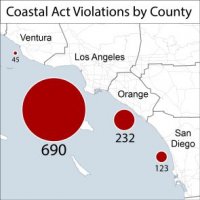
UPDATE (Sept. 10, 2013): Although the state Senate passed AB 976 on Friday, September 6, the bill failed concurrence in the Assembly and is now a two-year bill.
Californians love our coast, and for good reason: the Coastal Act has protected it for all of us, rich, poor and in between for four decades.
The California Coastal Commission is charged with implementing the Coastal Act, which was passed in 1976 to protect the state’s 1,100 mile coastline and public access to the coast. Its mission is: “To protect, conserve, restore, and enhance the environment of the California coastline.”
Unfortunately, the Commission has the unique distinction of being the only California agency that does not have the ability to levy fines when someone breaks the law.
Fortunately, a bill before the state legislature, AB 976 (Atkins) would give the California Coastal Commission the ability to quickly get the attention of violators and force them to comply with the Coastal Act.
If a driver goes 95 mph in a 65 mph zone and is pulled over by a traffic cop, they’re fined for speeding. The ability to not just write a ticket but ensure that the violator pays it – that’s what helps prevent bad behavior. Someone breaks the law, they pay a fine. Makes sense, right?
But in California, if a big developer intentionally restricts public access to the coast, fills in a wetland or erects a gate across a public trail, or builds a home on the coast with no permits, there are frequently zero consequences.The worst punishment they may face is having to put things back the way they were.
That’s because the Coastal Commission currently lacks the power to impose fines on those who intentionally violate the Coastal Act.
Passing this bill into law should be a no-brainer. As the bill’s author, Assemblywoman Toni Atkins, says: “If we really care about our coastline, we have a responsibility to make sure we preserve it for our kids and our grandkids.” After nearly 40 years without enforcement powers, the bill would finally give the Coastal Commission the authority to impose administrative civil penalties on people who intentionally violate the Coastal Act.
The commission needs enforcement authority in order to effectively implement the Coastal Act and protect all Californians’ rights to enjoy the coast. Without that authority, the commission has to go to court to collect penalties from anyone who violates the state Coastal Act by damaging coastal habitat, building without permission or blocking public access to the beach – a process which can take years, even decades.
According to the Los Angeles Times, which editorialized in support of the bill:
“The commission has a backlog of 1,944 violations that have not been resolved. Of those, nearly 29% are cases in which public access to the shore has been blocked. An additional 27% consist of unpermitted land alteration. An additional 24% are unpermitted developments in sensitive habitats. A third of the violations, 690, are in Los Angeles County. More than a quarter of all the state’s violations, 553, come from the Santa Monica Mountains and Malibu, where public access to the beaches has been a battle for decades.
Elsewhere, violations are varied and sometimes brazen. Developers of residential complexes have refused to build accessways even though their permits required it. Homeowners and others have stripped out vegetation without permission. Some have even used wetlands as garbage dumps.
Lacking the ability to issue tickets and fines, the Coastal Commission often has to wage tedious and protracted battles with developers and homeowners who violate the law and know that they can get away with it for years. Only the most egregious cases get taken to court, where fines can be imposed, and it can take a decade to get there.”
AB 976 would give the Coastal Commission the same ability as 20 other state regulatory agencies: the power to levy fines on those violating the law. It’s a commonsense proposal to protect the coast and every Californians’ right to enjoy it.


